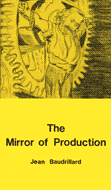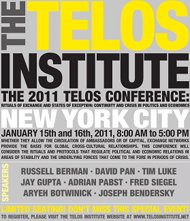This is the fifth—and last—in a series of posts that introduce the thought of historian Martin J. Sklar, as a prelude to a print symposium on his life and work in a future issue of Telos. For a fuller introduction, refer to the head note to the first TELOSscope post. On the basis of his understanding of political economy (see the third post) and international relations (see the fourth post), and building on his longstanding critique of sectarianism and vanguardism in left-wing politics, in his last decade Sklar argued that U.S. politics were undergoing what he termed a “transvestiture of left and right,” whereby each side of the political spectrum was (however unwittingly) adopting positions that are historically more in tune with the other end of the spectrum. Sklar’s argument will be more fully articulated in the posthumously forthcoming book American Century and World Revolution. For now, the following selections provide a window onto his evolving thinking.
|
This article argues that after more than two centuries, our system of justice is no longer functioning as intended by its founders. I argue that this breakdown can be ultimately traced to a philosophical dilemma at the heart of American civilization: the assumption that economic self-interest can by itself sustain ethical care for a common good. In treating economic freedom as a moral absolute, the American right has misconstrued the practical purpose of freedom and undermined justice and equality for all. In contrast to the ahistorical claim of libertarians that economic freedom should be treated as a moral value, the goal of the founders of the United States was very concrete: enabling most citizens to get basic economic needs met in peace and security. Free and open elections and a system of checks and balances would motivate the naturally more powerful to manage their own passions in ways that contributed to a common good. By contrast, in unchecked political systems that arose by the struggle for dominance among the powerful few, the de facto rulers lacked any motive to act in ways that were consistent with the interests of the average citizen. As Thrasymachus claims in Plato’s Republic, they habitually wrote laws that benefited themselves at the expense of everyone else. “Something in all men profoundly rejoices at seeing a car burn”: Pure Expenditure against ProductionThis is the second of two blog posts by Frederick H. Pitts that reassess the importance and impact of Jean Baudrillard’s The Mirror of Production. Read the first post here. Where the first post dealt with Baudrillard’s criticism of the productivism of political economy and its Marxist critique, the second deals with the implications of Baudrillard’s critical analysis for any radical alternative to production. This paper was presented at the 2011 Telos Conference, “Rituals of Exchange and States of Exception: Continuity and Crisis in Politics and Economics.” |
||||
|
Telos Press Publishing · PO Box 811 · Candor, NY 13743 · Phone: 212-228-6479 Privacy Policy · Data Protection Copyright © 2025 Telos Press Publishing · All Rights Reserved |
||||
 In the
In the  For Max Weber, the spirit of capitalism is best understood in terms of Calvinist divine predestination. But by focusing on the Protestant work ethic, Weber’s thesis about the origins of modern capitalism is at once too broad and too narrow. Too narrow because he neglects the counter-Reformation Baroque scholasticism of influential Catholic theologians like Francisco Suárez that sunders “pure nature” from the supernatural and thus divorces man’s natural end from his supernatural finality. As a result, human activity in the economy is separated from divine deification and the market is seen as increasingly autonomous. In short, human contract is severed from divine gift.
For Max Weber, the spirit of capitalism is best understood in terms of Calvinist divine predestination. But by focusing on the Protestant work ethic, Weber’s thesis about the origins of modern capitalism is at once too broad and too narrow. Too narrow because he neglects the counter-Reformation Baroque scholasticism of influential Catholic theologians like Francisco Suárez that sunders “pure nature” from the supernatural and thus divorces man’s natural end from his supernatural finality. As a result, human activity in the economy is separated from divine deification and the market is seen as increasingly autonomous. In short, human contract is severed from divine gift. 

